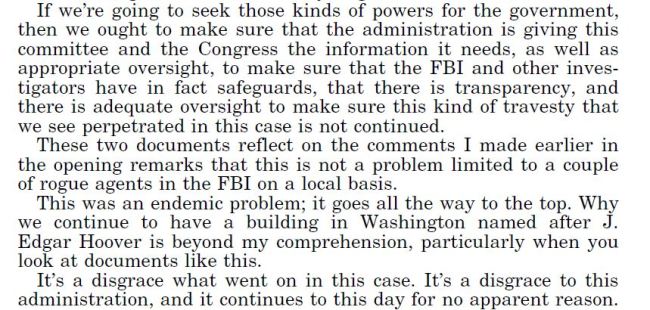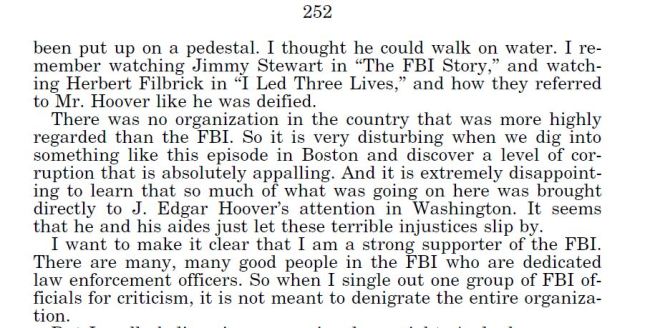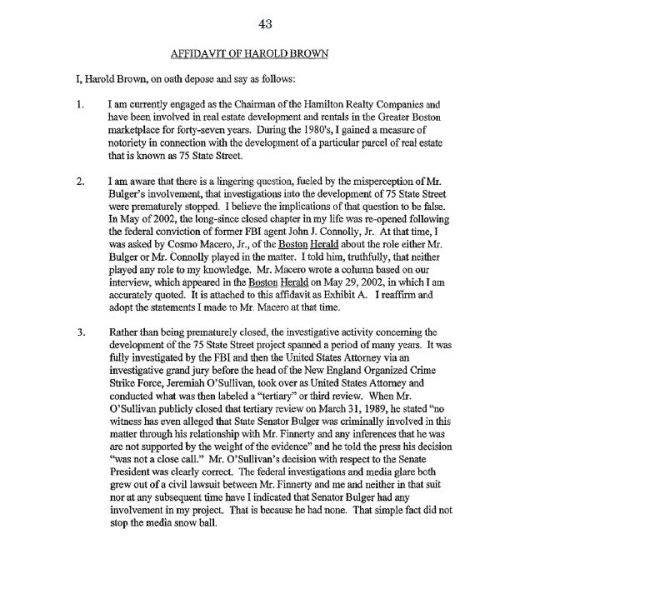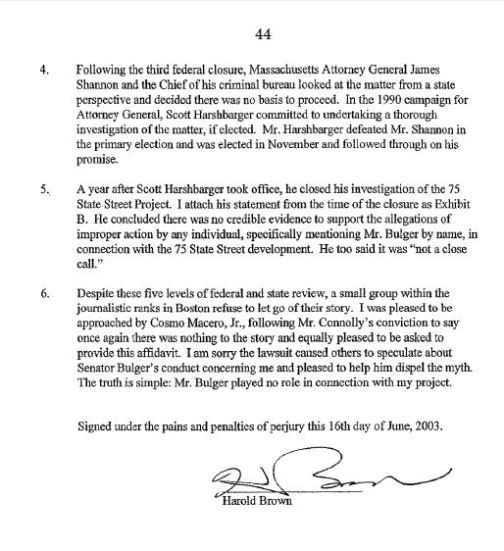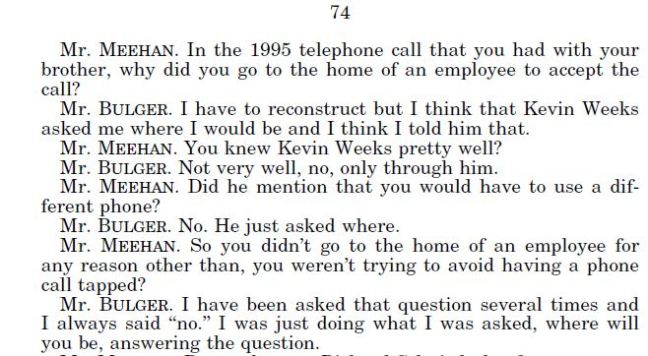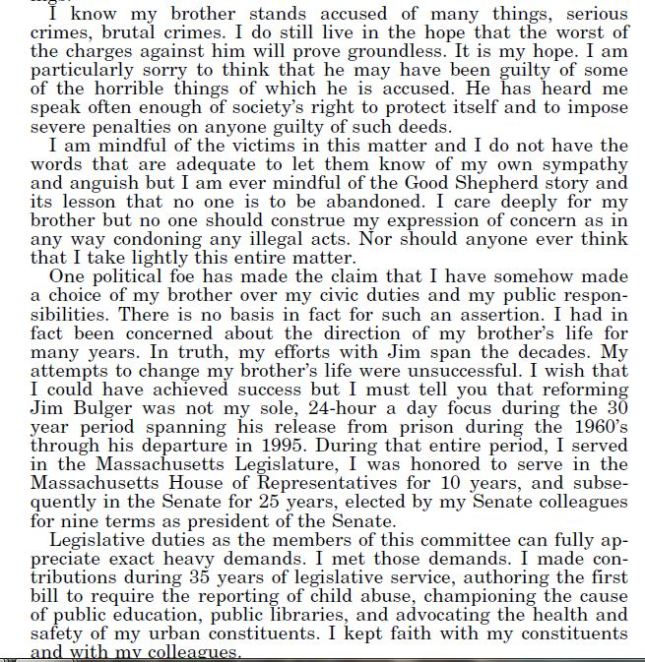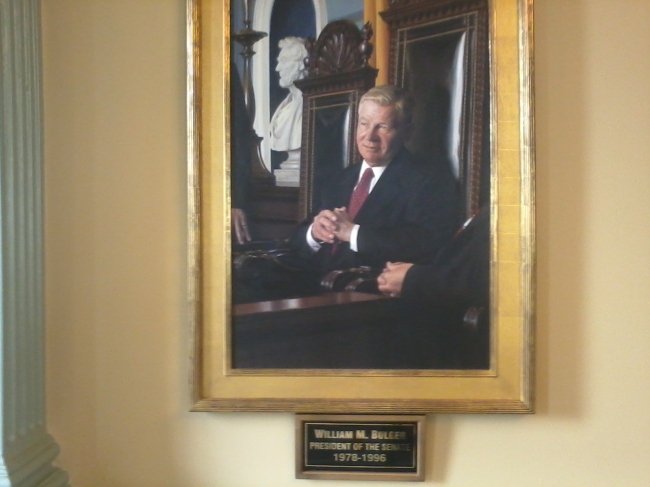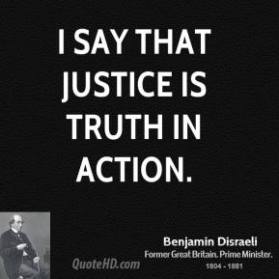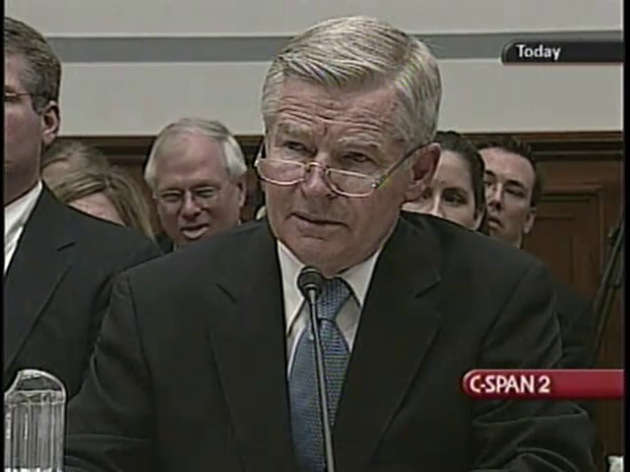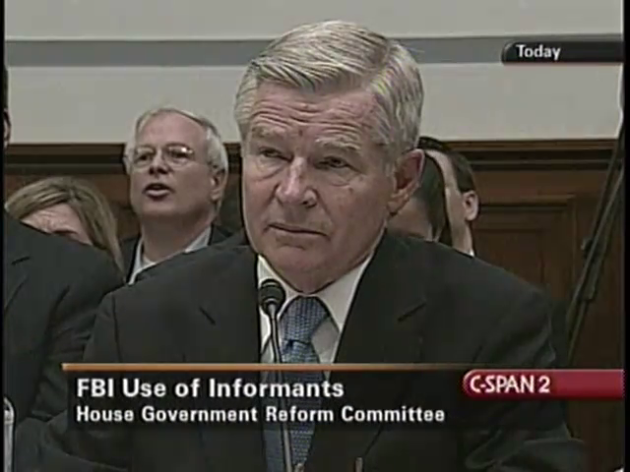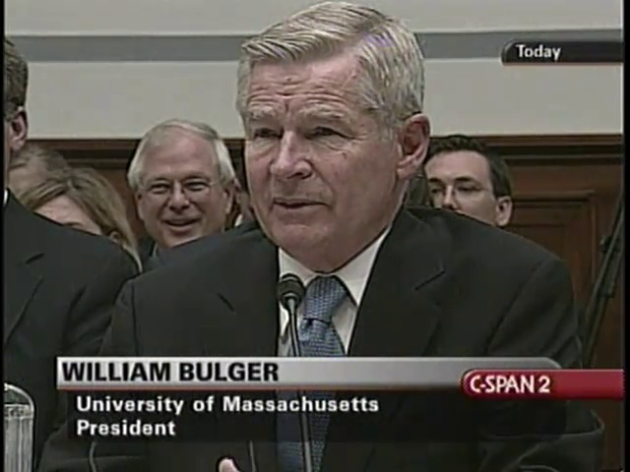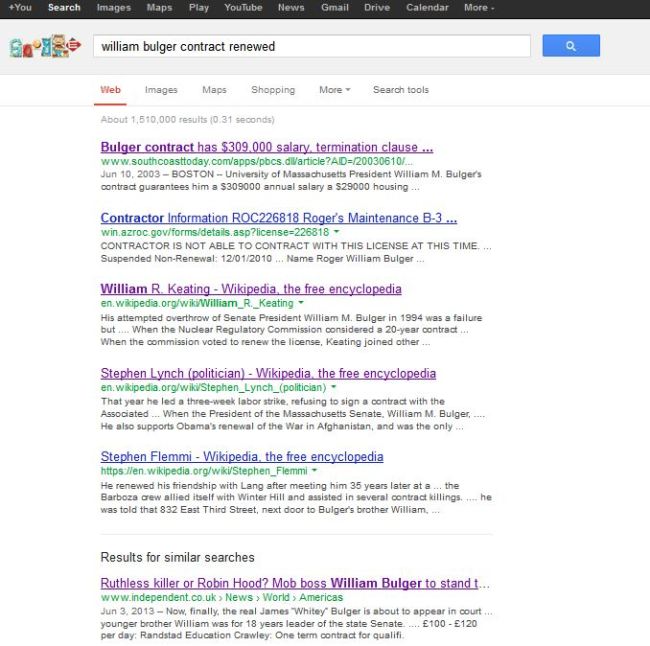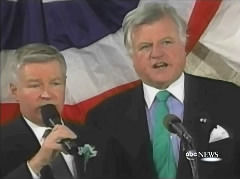The preceding post on this blog is entitled, “The Pursuit of Journalistic Truth and Justice.” That pursuit is elusive at times, as Scot Lehigh’s article about William Bulger in the August 9, 2013 issue of The Boston Globe attests. To illustrate, allow me to address its substance.
The article rejoices in how “Both Bulgers Can Soon Be Forgotten,” joining together the name of James Bulger, whose trial formally ended today with the jury’s guilty verdict on 31 of 32 counts, with that of his younger brother, William Bulger.
Lehigh proclaims that the end of the trial will “…help push the Bulger era further into Boston’s past.”
Yet, what is “the Bulger era”? That question will be answered last.
First, let us address Lehigh’s assertions. He blames Whitey Bulger for how he “managed to corrupt the FBI, turning the once-proud bureau into an enabler of his criminal reign.” Yet during the series of congressional hearings by the House Committee on Government Reform, it was determined that FBI Director J. Edgar Hoover himself was aware of impending murders and not only took no action, but also approved affirmative steps to ensure that the true murderer was protected while innocent men served decades in prison, some of whom died there.
Testimony from U.S. Representative John Tierney (D-MA) is excerpted below.
In short, James Bulger did not “manage to corrupt the FBI.”
As Tierney noted in 2002, it was an endemic problem — all the way to the very top. Is it possible that the FBI used James Bulger and, by its failure to prosecute or act far earlier, had a hand in enabling him? If J. Edgar Hoover himself knew of impending murders and failed to act — and subsequently protected those responsible, and even allowed innocent men to serve time, how did Whitey Bulger manage that?
Lehigh is simply wrong. He misinforms us all. The FBI was proud once, before the public knew what really went on behind its closed doors. Why else would more than one member of Congress seek to remove the name of J. Edgar Hoover from its headquarters? How much of that pride was an illusion? Even U.S. Representative Dan Burton (R-IN), to his credit, lamented how his perception of the FBI was forever shattered due to facts which emerged during the Committee’s work:
Next, Lehigh calls William Bulger “dishonorable.” This comes after the facts establish that members of Congress called J. Edgar Hoover dishonorable and call for the FBI headquarters to be scrubbed of his name. Somehow Lehigh neglects to mention that.
Instead, he opines that William Bulger is dishonorable, because he told the truth to a grand jury and candidly stated in one random excerpt The Boston Globe chose to publish in December 2002, that “It’s my hope I’m never helpful to anyone against him.” There was no context for when this was uttered, or what else William Bulger uttered during that testimony.
He also hoped “the worst of the charges would be proved groundless,” an unrealized hope as today’s jury verdict indicates. Having a hope is not a statement of fact or even of intent; it is an emotion. Imputing wrongdoing to a person’s feelings is a wrong unto itself. Contrary to what The Globe assumed, that expression of hope was no refusal to cooperate. Throughout life, a person hopes for many things, as much as the reality may be otherwise.
Importantly, omission is a common modus operandi of The Globe. Beginning on page 222 of his memoir, While the Music Lasts: My Life in Politics, William Bulger describes one anecdote in which he sat for an in-person interview with none other than Dick Lehr and Gerald O’Neill from The Boston Globe‘s “Spotlight Report Team.”
Described in the first person, it was in the Fall of 1988 that William Bulger agreed to sit for an interview and respond to questions even though he was about to leave for vacation in Europe. On that occasion, Bulger was also asked about the 75 State Street matter, which was investigated exhaustively by five levels of state and federal review. Bulger also promised to provide follow-up information when he returned from vacation, and O’Neil promised not to print anything until continuing the interview upon Bulger’s return in twelve days.
Yet, it was a day or so later, while William Bulger was in Belgium, that Lehr and O’Neil authored a front page Globe report proclaiming, “Senate President William M. Bulger has benefited from a trust bankrolled with money that a Boston real estate magnate claims was extorted from him in 1985…”
In short, Lehr and O’Neil lied to Bulger and waited until they knew he would be out of the country to publish their report; are not lying and deceit dishonorable?
Lehigh lies to us, too. Below is an affidavit submitted by HAROLD BROWN himself, expressly noting the “five levels of state and federal review” — investigations — and even his own statement sworn under penalty of perjury declaring once and for all (or so one would think) as follows: “The truth is simple: Mr. Bulger played no role in connection with my [75 State Street] project.” Instead of reading Scot Lehigh’s misinformation, go ahead and read the truth from Harold Brown himself:
Whom do we believe? Scot Lehigh invokes “the allegation that he and his law associate extorted $500,000 from developer Harold Brown during the mid-1980s…” but here, we have developer Harold Brown expressly stating that William Bulger was not involved at all. Do we believe Lehigh reporting on Brown, or do we believe Brown? That journalistic truth is self-evident.
In our pursuit, we have choices about which way to go. Reader, I hope you tread where the light shines brightest; it may be hard to see, but it is there if you dare to open your eyes.
Lehigh further associates William Bulger with John Connolly, to whom he goes so far as to poetically refer as a “fawning acolyte.” According to the dictionary, the primary definition of an “acolyte” is “one who assists a member of the clergy…” So now John Connolly was William Bulger’s altar boy. Without citing any source, Lehigh recounts an anecdote in which John Connolly purportedly advised William Bulger to cooperate with federal investigators and agree to be interviewed. How is cooperating with an investigation somehow insidious or dishonorable? How does that support Lehigh’s point?
Lehigh also mentions Jeremiah O’Sullivan’s role in “the second investigation” but fails to mention the third, fourth, or fifth investigation — or the sworn statement of Harold Brown himself. If Lehigh really knew the facts, he would report that O’Sullivan participated in the “tertiary” investigative review. We learn that directly from Harold Brown.
Finally, Lehigh notes how “It’s also long been whispered…” that the indictment and subsequent trial of Senate Majority Leader Joseph DiCarlo in 1977 paved the way for Bulger to become Senate President. Of course, Kevin Harrington was still serving as Senate President at the time and he chose Bulger to be Majority Leader prior to his own resignation in 1978.
This investigation into construction contracts with the Commonwealth of Massachusetts actually prompted widespread ethics reform and led to the establishment of the first Office of the Inspector General (OIG) for any state in the United States, to oversee state business. The Ward Commission was a big deal at the time and issued a substantial twelve volume report by the end of 1980.
In his capacity as Senate President, William Bulger played a pivotal role in pushing this oversight reform bill through. To suggest that Bulger somehow masterminded the indictment of DiCarlo is to similarly suggest that Gerald Ford was secretly responsible for the investigation of Spiro Agnew which led to his own selection as President Nixon’s Vice President. To say that Ford had a hand in Agnew’s criminal indictment and that it “paved the way” for Ford to become President of the United States would surely draw curious glances from any rational person. Yet this is exactly what Lehigh proffers here in regard to William Bulger. Think about it. Does it make sense, just because he says it does?
Wrongdoing is wrongdoing, no matter who commits it. DiCarlo was indicted because there apparently was evidence of criminal culpability; why is that nefarious in any way? This lopsided logic suggests that those “whispers” which Lehigh mentions are perhaps attributable to voices in his own head. Hopefully this posting will offer some level of help to him in understanding the extreme depth of his deficiency.
Also mentioned by Lehigh is “the phone call” in January of 1995 by which “Whitey and William arranged for a secret telephone call at the home of one of William’s associates, where it would go undetected by investigators.”
William Bulger spoke to that during his 2003 testimony as well during questioning by U.S. Representative Marty Meehan (D-MA):
Thus, the official record states that it was Kevin Weeks who arranged the call, without William Bulger having advance knowledge. Given the central role which Kevin Weeks had in the Trial of Whitey Bulger, surely he could have spoken to that if asked; yet I am unaware of that question being raised by either the prosecution or Bulger’s defense attorneys.
William Bulger also explained the reason for his concern for his brother, drawing reference to his religious faith and “The Good Shepherd story” — that no one should be turned away; he also recalls “society’s right to protect itself and to impose severe penalties on anyone guilty of such deeds.” Specifically, the story originates directly from John 10:11-12 in the New Testament in which Jesus Christ declares, “A thief comes only to rob, kill, and destroy. I came so that everyone would have life, and have it in its fullest. I am the good shepherd, and the good shepherd gives up his life for his sheep.”
There is no reason to believe his statement was not true, given his Catholic upbringing. Where is the dishonor there? The larger context of William Bulger’s statement follows:
Taking the facts into consideration, it is clear that what Lehigh presents as fact in support of his opinion, is, in fact, fiction. He is wrong on Harold Brown, on the phone call, on the “once proud FBI,” and he is also wrong about “the Bulger era.” James Bulger and William Bulger are two separate people.
Today’s jury verdict may speak to the legacy of James Bulger, but the era of William Bulger will not end. Whether Scot Lehigh likes it or not — and true to the spirit of public service — the shadow of William Bulger is a part of the Boston landscape, from Hynes Convention Center and Symphony Hall, to the Public Gardens and Boston Common, to the Massachusetts Education Reform Act of 1993, to the JFK Library in his own South Boston district, the Boston Public Library, the preservation and restoration of Castle Island, to the Massachusetts Office of the Inspector General. That era extends to new generations of leaders through the William M. Bulger Presidential Scholarship and William M. Bulger Classics Award at the University of Massachusetts. On the national level, there is also the William M. Bulger Award for Excellence in State Leadership from the National Conference of State Legislatures (NCSL).
Like the story of his own life, the William Bulger Era is more than a name, and his living vision for the City on a Hill and its good people proves how that era is not a name at all.
In the Massachusetts State House on Beacon Hill, a portrait hangs in the Senate Reception Room depicting a bust of President Abraham Lincoln looking over William Bulger’s shoulder. It is altogether fitting and proper that he has the last word here:
“I am glad I made the late race. It gave me a hearing on the great and durable question of the age, which I could have had in no other way; and though I now sink out of view, and shall be forgotten, I believe I have made some marks which will tell for the cause of civil liberty long after I am gone.” — Abraham Lincoln, Letter to Anson G. Henry, November 19, 1858

